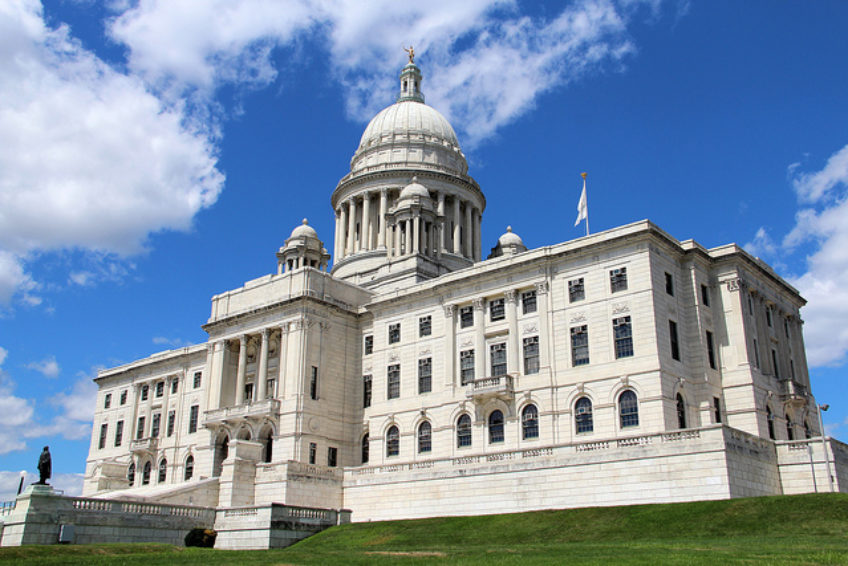Rhode Island State of the State: Governor Applauds Success of Past Reforms, Misses on Need for More
During her annual State of the State address, Rhode Island Governor Gina Raimondo pointed to an improving economy evidenced by “cranes in the sky” and the plunge in the state’s unemployment rate from one of the worst in the nation to now just 4.3 percent. She credited the many programs she’s spearheaded— including tuition-free programs for community college, economic development tax incentives, small business loan initiatives, and vocational training programs— as primary reasons for the state’s recovery.
Although Governor Raimondo deserves recognition for often fighting unfair preferential tax treatment of politically favored entities, she has fallen short of putting a complete end to the practice. The governor argued that the incentive programs used by “Massachusetts, and nearly every other state in the northeast” fail to properly diversify, burning taxpayers as a result. By combining incentives with work-training programs, the governor believes Rhode Island avoids the pitfalls of cronyism elsewhere.
No matter how they’re structured, tax incentives—whether subsidies, carve-outs, or credits—impair long-term growth. Governor Raimondo argues “performance metrics” or cost-benefit analyses make her incentives programs superior to those of other states, but the evidence shows their outcomes are the same. They may produce visible results in the select companies receiving the handouts, but tax rates remain higher for everyone else, stunting broad prosperity and economic growth.
The state is hardly the standard bearer of economic competitiveness. Consider that the state shoulders the 5th highest property tax burden in the nation, top personal and corporate income tax rates near the middle of the pack nationally, debt service burden the 2nd worst nationally, and 9th highest workers’ compensation costs. Instead of pursuing these incentive programs, the governor should focus on needed broad-based economic reforms. Despite modest improvement, GDP growth has lagged behind nearby New York, Massachusetts, and Connecticut. Lawmakers should pursue broad policy reform rather than tease businesses with preferential tax treatment to attract them to the otherwise inhospitable environment.
To the governor’s credit, responsible fiscal management enabled a steep reduction in unemployment insurance taxes. She lauded that the state has shot from 50th to 23rd in unemployment tax burden in just one year. She also noted that four years ago, the Gallup Jobs Index ranked the state’s economy dead last, but it ranks 29th today. The ALEC-Laffer State Economic Competitiveness Index also reflects modest improvement in economic outlook from 45th in the nation in 2014 to 36th currently.
Moving to education, Governor Raimondo says, “there is still much to do” despite three times as many pre-k classrooms as there were four years ago. She requested more than $1 billion of increased education funding over the next five years, declaring a need for “once-in-a-generation investment to fix our schools.” As evidence of dilapidated infrastructure, she noted several schools recently had to close due to burst water pipes. Her proposal would require a $400 million increase in general revenue appropriations, with another $250 million coming from bond offerings. Cities would be responsible for the remaining $350 million.
The governor added that while “70 percent of jobs in Rhode Island require more training and education than just a high school diploma…they don’t all require a four-year degree.” She asked lawmakers to expand the successful on-the-job and high school technical training programs championed by her throughout her tenure. She also proposed additional funds for a job training program targeting recovering substance abusers.
Rhode Island ranks 17th nationally in standardized test performance and has substantially increased academic standards in recent years. However, with school choice and other policies in dire need of further improvement, school infrastructure surely is not the only education problem.
The governor renewed her call for a line-item veto proposition on the November ballot, asking voters for this constitutional change in order to enhance fiscal responsibility. She reminded voters that many other governors already possess this power to ”eliminate waste and give taxpayers confidence in their government.”
To bring lasting prosperity to Rhode Island, Governor Raimondo and the legislature should build on the pro-growth unemployment tax reduction. Broad-based cuts to personal and corporate income tax rates would assist workers and incentivize business growth better than any crony handout. Between the failure to address rising pension debt, and the governor’s dangerous divestment efforts in pension management, Rhode Island has a long way to go. The governor should pursue an agenda more constructively ambitious than revealed in her address, and set sights on pro-growth tax and budget reform, Rhode Island can “keep going.”

